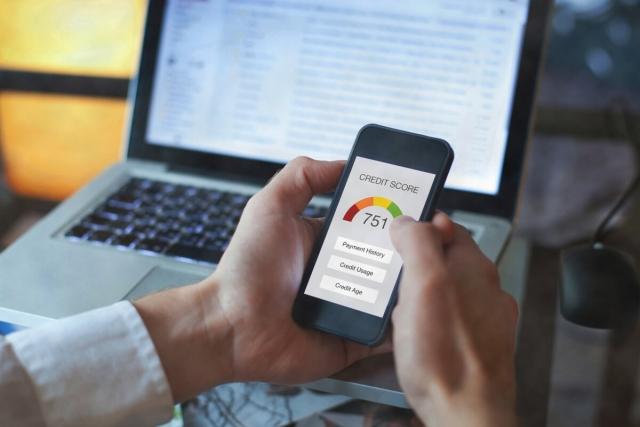Key Takeaways
- Most landlords require a score of at least 600, with 650+ being more competitive.
- In major cities or for luxury rentals, scores of 700+ can be expected.
- Your credit report matters just as much as your score, and landlords will read through your credit report to look for red flags.
- Renters with low scores can improve their chances of renting by providing proof of income, renting with a co-signer, or offering to pay a larger deposit.
So, you’ve found the perfect place. You’ve searched high and low, toured apartments, talked with property managers, and narrowed down your choices to one finalist. Congratulations!
Your next step is to apply, get accepted, and sign a lease. But before you do all that, you need to make sure your credit is in a good spot.
Table of Contents
- Why Landlords Check Credit
- Understanding Your Credit Report
- What Credit Score Do You Need?
- Renting with Bad Credit
- How to Improve Your Credit Score
- FAQs
Why Landlords Check Credit
Background checks are a standard part of the rental application process, and property managers use the information in your background check to determine whether you’ll be a trustworthy tenant. Background checks show your rental history, employment history, criminal history, and credit history.
Property managers often rely on credit reports to accept or deny a rental application. Credit reports show your payment history on lines of credit, delinquent accounts, and derogatory marks like collections. Looking at a credit report can clue landlords in on whether a renter will pay rent on time.
Understanding Your Credit Report

Your credit report is essentially a report card for your credit behavior. A credit report shows your personal information, employer history, credit accounts, and credit inquiries.
When you apply for an apartment, the property manager will look at your payment behavior, outstanding accounts, and any negative marks like overdue payments or collections to determine if you’re a trustworthy tenant.
Credit score vs. credit report
Your credit score is a numeric summary of everything in your credit report. Credit scores range from 300 to 850, with 850 being a perfect score. Each credit bureau uses its own algorithm to calculate your credit score, so your score will vary between your credit reports.
What Credit Score Do You Need?
The credit score you need to rent an apartment depends on the type of apartment you’re looking to lease and the local market trends.
Typical ranges
There’s no universal minimum, but most property managers require a credit score of at least 600. Luxury apartment communities may require a score closer to 700.
According to a study by The Zebra, most renters have a credit score of around 650. This means that a credit score higher than 650 will make you more appealing to landlords than other renters.
|
Credit Score |
Landlord View |
Application Tips |
|
700+ |
Very low risk |
Strong candidate, most rentals available |
|
650-699 |
Good/average |
Include income and rental history |
|
600-649 |
Riskier, but possible |
May need a larger deposit or co-signer |
|
Below 600 |
High risk |
Strengthen your application or find a private landlord |
Regional and market factors
The credit score you need to rent an apartment may vary depending on the city you’re moving to.
Rentals in competitive, urban markets often require higher credit scores due to higher demand and limited supply. However, rentals in lower-demand markets like rural areas may be willing to accept applicants with lower credit scores.
According to a study by WalletHub, most residents in markets like San Francisco or Boston have credit scores over 670. In less competitive markets like Birmingham, AL, or Columbus, GA, a credit score of 600-650 may suffice.
What Else Do Landlords Look At?
Landlords review your entire credit report to decide whether you’ll be a trustworthy tenant. In addition to your credit score, landlords will look for the following:
- Recent late or missed payments
- Accounts in collections
- Eviction history
- Income relative to rent
- Credit utilization ratio
Late or missed payments, accounts in collections, and prior evictions show landlords you’re likely to miss rent payments.
Your income relative to the rent shows whether you can reasonably afford rent. Most property managers require tenants’ monthly income to be three times the rent.
Your credit utilization ratio is the percentage of available credit you use. A credit utilization rate under 30% indicates that you’re a reliable borrower, and you can be trusted to pay back what you owe. Landlords look at this ratio to determine whether you’ll be likely to pay rent on time each month.
Renting with Bad Credit

It can be discouraging looking for a new place when you have bad credit or no credit, especially if your applications keep getting denied. With a little patience and flexibility, you can meet property managers halfway and find a way to lease your dream apartment.
Offer to pay a higher security deposit
Landlords use a security deposit to cover the cost of unpaid rent or property damage. Offering to pay a higher-than-normal security deposit may ease a property manager’s concerns about your reliability by giving them a more substantial safety net.
Bring references and proof of income
Providing proof of your character and income can help establish trust with a property manager. Request character references from your coworkers or managers, and contact past landlords to provide written confirmation of on-time rent payments.
Make sure you come prepared with proof of income, too. You can use pay stubs, your tax return, bank statements, or a job offer letter to show a landlord that you can afford monthly rent payments.
If you had a one-time event that hurt your credit, like a job loss or a medical emergency, include a letter of explanation that provides context. Explaining why negative marks on your credit report are outliers can show property managers that you're unlikely to repeat past mistakes.
Have a cosigner or guarantor
Signing a lease with a cosigner or guarantor with good credit can make it easier for you to secure an apartment. Both cosigners and guarantors agree to take on financial responsibility for your rent payments, but they have a few key differences:
- A cosigner’s name is on the lease as a tenant, giving them legal rights to live on the property. A guarantor is not on the lease as a tenant.
- Cosigners are immediately responsible for paying rent, while guarantors are only responsible for paying rent if the tenant fails to pay rent on their own.
Cosigners and guarantors offer a financial safety net if you fail to pay rent, making property managers more likely to rent to you.
Find a roommate
A cosigner can double as a roommate, making it a win-win. Renting with a roommate tends to be cheaper, saving you money and making it easier to get approved for a rental by lowering the income required to rent.
Rent from a private landlord
Private landlords may be more willing to compromise on renting requirements than a large apartment community. A private landlord will be able to have an open discussion with you about your finances and may be open to negotiations. Come prepared, be honest, and show landlords that you’re working toward a better credit score.
How to Improve Your Credit Score
There are many ways to improve your credit score, but here are four habits that can set you up for success.
Get a credit card
If you don’t already have a credit card, now’s the time to apply for one. If you’ve struggled to get a standard credit card, there are other options.
One option is a secured credit card. Like an apartment, a secured card requires a security deposit that will cover any missed payments. A secured card is a great way to show credit card companies that you’ll pay your bills on time, and they may eventually upgrade you to a standard card. You’ll get your security deposit back when you close or upgrade your secured card.
Another option is to become an authorized user on someone else’s credit card account. Having a close friend or family member with good credit add you as an authorized user on their account will improve your credit by boosting your credit age and history. It’s important to understand that you and the primary cardholder can help or hurt each other’s credit scores, so choose someone you trust and have open conversations about your bill payments.
Pay bills on time
Once you get a credit card, pay your credit card bill in full every month. This helps you avoid interest rates while adding good payment behavior to your credit report. Set up automatic payments to make sure you always pay on time.
If you have debt, make it a priority to pay off outstanding accounts. Older late payments won’t impact your score as much as recent bills, but the sooner your debt is paid, the sooner your score can increase.
Use a rent reporting service
Rent reporting services report your rent payment behavior to the three credit bureaus. This can improve your credit score by helping you build up good payment history. Enrolling in a rent reporting service typically costs a small fee, but it pays off in the long run.
Keep in mind that some rent reporting services are “positive-only” (only report on-time payments), while others are “full-file” (report both on-time and late or missed payments). For rent reporting to help raise your credit score, you’ll need to make sure you’re able to pay rent on time.
Check your credit reports
Federal law entitles you to a free credit report from each credit bureau every year. Request copies of your credit reports every year so you know where you stand.
Each bureau uses a different algorithm to calculate credit scores, so your three credit reports will look a little different. Make sure you read through all three to verify the information, and contact the credit bureaus to dispute any errors you find. Disputing inaccurate negative marks can lead to quick improvements.
Monitor your credit
Credit monitoring apps provide you with a snapshot of your credit report and a monthly credit score. You’ll be notified of any changes to your credit score, helping you address issues immediately.
In addition to helping you keep an eye on your credit, credit monitoring apps can also help prevent fraud and identity theft by notifying you of unfamiliar new credit accounts on your report.
There’s no one-size-fits-all approach to building your credit, and securing an apartment can look different if you’re working on bringing your credit score up. Be honest with property managers, and be willing to make concessions to lease your dream apartment. Once your credit score starts to increase, you’ll be on your way to renting with no issue.
This article was originally published on August 6, 2025.
FAQs
Does checking my credit affect my score?
No, checking your credit will not impact your score. Checking your credit just to monitor your score is considered a “soft pull” and will not lower your score.
However, your credit score will take a hit after a hard pull. When you apply for a new line of credit, a lender or creditor will run a hard pull. Hard pulls impact your score and will stay on your credit report for up to two years.
Why do I have multiple credit scores?
The three credit bureaus—Experian, Equifax, and TransUnion—all have unique algorithms to calculate your credit score.
In addition to each bureau’s credit score, you also have a FICO score and a VantageScore. Like the credit bureaus, FICO and VantageScore use unique algorithms that give different weights to different parts of your credit report. Most lenders will look at your FICO score when you apply for a new line of credit, but most credit monitoring services will show your VantageScore.
Which credit scoring model do most landlords use?
According to Debt.org, roughly 90% of lenders check a candidate’s FICO score. However, if a property manager uses Apartments.com to accept rental applications, they’ll see your credit score from TransUnion.
How long will debt stay on my credit report?
According to Experian, most negative marks like late payments, collections, or repossessions stay on your credit report for up to seven years. Chapter 7 bankruptcy will stay on your credit report for up to 10 years.
How long do credit checks take?
Credit checks can take anywhere from a minute to a few business days, depending on the platform used to conduct the credit check. The entire approval process for an apartment usually takes one to three business days.
Can I rent with no credit history?
Yes, you can rent with no credit history, but it’ll be more difficult to get approved for an apartment. You may have to find a cosigner or pay a larger security deposit, and you should come prepared with references and proof of income.
How long does it take to improve a credit score enough to rent?
You’ll begin to see short-term improvements from paying off debt and disputing inaccuracies in your report after about a month. For long-term credit growth, it’ll take at least six months to see the effects of building good payment history and recovering from past mistakes.






